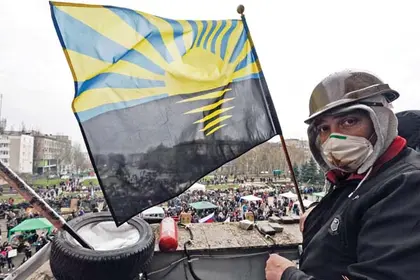Located next to a square devoted to Taras Shevchenko, Ukraine’s most celebrated literary bard and a critic of czarist Russia, the 11-story building is heavily fortified with sandbags, barbed wire, car tires and masked guards armed with iron bars, baseball bats and police truncheons.
It’s sort of a reverse EuroMaidan Revolution – and that’s the point of the men who seized the complex.
“We’ve already accomplished what we wanted, we gave power to the people and formed an independent republic,” said Nikolai Solntsev, a member of the group’s political council, in remarks to journalists invited inside the building.
JOIN US ON TELEGRAM
Follow our coverage of the war on the @Kyivpost_official.
When he refers to “the people,” Solntsev points to several hundred supporters gathered on the street. The size of the crowds hasn’t increased since pro-Russian secessionists forcibly overwhelmed a dozen police officers on April 6.
“Ninety-nine percent of the people are behind us,” he says, above the sound of Russia’s NTV television channel blaring on loudspeakers.
But the power he speaks of is not to let local governments keep more of the tax revenue they collect, or have their say in which roads get their potholes filled.
The goal is to break away from a predominantly ethnic Ukrainian region and stage a referendum like the one in Crimea where the only choices on the ballot would be full autonomy for Donetsk Oblast or joining Russia.
As Solntsev moves on, an elderly lady some 10 meters from him hands out fliers that call on residents of the Donbas – the steel and coal industrial region that encompasses Donetsk, Luhansk and Kharkiv oblasts – “To Rise Up!”
Mirroring the Kremlin’s line of the EuroMaidan Revolution that toppled Viktor Yanukovych as president, the activists give four reasons for the rebellion and attempt to secede from Ukraine:
World War II monuments are being destroyed;
Beating and humiliation of veterans;
Terror against the Russian-language speaking population in subservient Nazi-held territories; and
Forcible takeovers of Orthodox churches by Greek-Catholic believers backed by Nazi bands.
The group anonymously voted to start foreign relations with Russia, Kazakhstan, Belarus and “international institutions like the United Nations,” said deputy Vyacheslav Kuklin, who “doesn’t recognize the illegitimate government in Kyiv.”
He goes on further, without evidence, to say: “What’s happening is genocide, a tragedy of the Ukrainian people,” he continued, referring to the EuroMaidan Revolution and the interim government that he said was installed by the West that funded “western Ukrainian fascists.”
Yanukovych, a fugitive hiding out in Russia on mass murder charges, has blamed “fascists” for taking power from him in his rare public appearances from Rostov-On-Don in southern Russia. That’s the same line used by Russian President Vladimir Putin.
Council chairman Denis Pushilin denied that Russia is funding the secessionist movement.
“Show me how the Federal Security Service is helping us,” he said, referring to the Russian successor of the Soviet KGB, adding that the only backing Russia gives is “on issues of foreign affairs on an international level.”
He emphasized that the masked men, many of whom say they are from Kherson Oblast and Mariupol, a coastal city of Donetsk Oblast on the Azov Sea, had no arms and are sober, despite numerous empty bottles of tequila, vodka and whiskey seen from the stairwell leading up to the 11th floor conference room.
Pushilin said a referendum will be held by May 11 on “sovereignty,” adding that the region is ready to take in people from the “repressed oblasts of Mykolayiv and Kharkiv” where pro-Russian protests fizzled and police successfully re-took an occupied building.
He said he is for “Russian peacekeepers to ensure a safe vote” on secession.
Illya Karlov, a “fighter” whose face is streaked with paint and who has a knife tucked into a pocket chest, is another of the men who have seized the building. He is from Kherson, “a simple man, a laborer” and a member of Russian Unity, the same party to which Kremlin-installed Crimean Prime Minister Sergei Aksyonov belongs.
“Russians are our brothers…I don’t want people to impose their will on us,” he said.
While it’s true that eastern Ukraine was least supportive of the EuroMaidan Revolution that toppled Yanukovych, most polls show a clear majority want to stay in Ukraine, not join the Russian Federation.
Dissatisfaction runs high, however, prompting calls for federalization or, at least, decentralization.
A GfK Ukraine survey in March found that only 9 percent in eastern Ukraine believe the country is going in the right direction in comparison to 36 percent in western and central Ukraine. The same poll found that 20 percent of eastern Ukrainian residents favor the change in government following Yanukovych’s overthrow, whereas 57 percent favor it in the rest of the nation.
A Razumkov Center poll in December, when the first EuroMaidan deaths happened, found that 18 percent of eastern Ukrainians favor the federalization of Ukraine, the most than any other region; only 14 percent in the east are for southeastern Ukraine to separate and join Russia.
Yevgeniy Sidorov, a 28-year-old waiter who hails from the coal mining town of Ugledar, stood near the government building. Holding a bag of fireworks, he is quick to denounce Kyiv’s newly appointed Donetsk Oblast governor, Serhiy Taruta, a billionaire oligarch.
He believes all 450 members of parliament are “drug users,” and that Yanukovych’s opponents were behind the sniper shootings on Feb. 20, the bloodiest day of EuroMaidan, when dozens of protesters were assassinated.
Three kilometers away, pro-Russian presidential candidate Mykhailo Dobkin – representing the former ruling Party of Regions that Yanukovych led – was scheduled to make a campaign trail stop at the Palace of Sports.
Kyiv Post editor Mark Rachkevych can be reached at [email protected].
You can also highlight the text and press Ctrl + Enter



